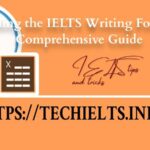Mastering a diverse IELTS Writing Vocabulary is crucial for excelling in the IELTS Writing test. It allows candidates to express their ideas clearly and effectively, demonstrating a strong command of the English language. In this article, we explore 50 essential vocabulary words for the IELTS Writing test, along with examples to illustrate their usage.

The Importance of IELTS Writing Vocabulary
In both Task 1 and Task 2 of the IELTS Writing test, a varied and precise vocabulary can significantly boost your score. Not only does it showcase your language proficiency, but it also helps in articulating your thoughts more accurately and persuasively.
50 Essential IELTS Writing Vocabulary
- Prevalent (adj.) – widespread; common
- Example: Solar energy is becoming more prevalent as a renewable energy source.
- Elicit (v.) – to draw out a response or reaction
- Example: The teacher’s question elicited a variety of opinions from the students.
- Pivotal (adj.) – of crucial importance
- Example: Education plays a pivotal role in shaping an individual’s future.
- Mitigate (v.) – to make less severe
- Example: Planting trees can mitigate the effects of urban pollution.
- Exacerbate (v.) – to make worse
- Example: Overfishing exacerbates the depletion of marine life.
- Innovative (adj.) – featuring new methods; advanced and original
- Example: Innovative technologies are transforming the way we work.
- Detrimental (adj.) – causing harm or damage
- Example: Smoking is detrimental to your health.
- Cumulative (adj.) – increasing or increased in quantity, degree, or force by successive additions
- Example: The cumulative effect of sleep deprivation can significantly impact health.
- Disparity (n.) – a great difference
- Example: There is a significant disparity in wealth between the world’s richest and poorest countries.
- Catalyst (n.) – something that causes activity between two or more persons or forces without itself being affected
- Example: Technological advancements were a catalyst for the Industrial Revolution.
- Ambiguous (adj.) – open to more than one interpretation; not having one obvious meaning
- Example: The ambiguous nature of the question led to varied responses.
- Coherent (adj.) – logical and consistent
- Example: For an essay to be effective, it must be coherent and well-structured.
- Concur (v.) – to agree
- Example: The scientists concur with the findings of the study.
- Dichotomy (n.) – a division or contrast between two things that are represented as being entirely different
- Example: The dichotomy between traditional and modern teaching methods can be striking.
- Ephemeral (adj.) – lasting for a very short time
- Example: The joy of passing the exam was ephemeral, soon replaced by anxiety for the next challenge.
- Feasibility (n.) – the state or degree of being easily or conveniently done
- Example: The feasibility of the new public transport system was questioned due to high costs.
- Gratuitous (adj.) – uncalled for; lacking good reason; unwarranted
- Example: The movie was criticized for its gratuitous violence.
- Heterogeneous (adj.) – diverse in character or content
- Example: A heterogeneous group of students can bring diverse perspectives to class discussions.
- Impetus (n.) – the force or energy with which a body moves
- Example: The scholarship gave her the impetus to pursue higher education.
- Juxtapose (v.) – to place or deal with close together for contrasting effect
- Example: The article juxtaposes the lifestyles of the rich and the poor.
- Kudos (n.) – praise and honor received for an achievement
- Example: The scientist received kudos from the community for her groundbreaking research.
- Lament (v.) – to express sorrow; to grieve
- Example: Environmentalists lament the loss of biodiversity due to deforestation.
- Mundane (adj.) – lacking interest or excitement; dull
- Example: Most people find their mundane routines to be monotonous.
- Nefarious (adj.) – wicked or criminal
- Example: The plot of the novel revolves around the protagonist’s fight against a nefarious villain.
- Ostensible (adj.) – stated or appearing to be true, but not necessarily so
- Example: The ostensible reason for his absence was illness, but in reality, he was on holiday.
- Pertinent (adj.) – relevant or applicable to a particular matter
- Example: Her comments were pertinent to the discussion at hand.
- Quintessential (adj.) – representing the most perfect or typical example of a quality or class
- Example: The novel is the quintessential example of classic literature.
- Rampant (adj.) – flourishing or spreading unchecked
- Example: Cybercrime is rampant in today’s digital world.
- Stringent (adj.) – strict, precise, and exacting
- Example: The government has imposed stringent environmental regulations.
- Tantamount (adj.) – equivalent in seriousness to; virtually the same as
- Example: In some cultures, refusing a gift is tantamount to insult.
- Ubiquitous (adj.) – present, appearing, or found everywhere
- Example: Mobile phones are ubiquitous in modern society.
- Viable (adj.) – capable of working successfully; feasible
- Example: The company is looking for a viable solution to reduce costs.
- Warrant (v.) – to justify or necessitate (a certain course of action)
- Example: The evidence does not warrant such harsh criticism.
- Yield (v.) – to produce or provide (a natural, agricultural, or industrial product)
- Example: The new farming techniques yield more crops per hectare.
- Zealous (adj.) – having or showing zeal; passionate
- Example: The young activist is zealous about environmental issues.
- Aberration (n.) – a departure from what is normal, usual, or expected, typically an unwelcome one
- Example: The economic crisis was an aberration, which the country hopes to recover from soon.
- Benchmark (n.) – a standard or point of reference against which things may be compared
- Example: The test scores were a benchmark for the school’s improvement over the years.
- Conundrum (n.) – a confusing and difficult problem or question
- Example: Philosophers have long been faced with the conundrum of free will.
- Disseminate (v.) – to spread or disperse (something, especially information) widely
- Example: Social media platforms are used to disseminate information quickly.
- Empirical (adj.) – based on, concerned with, or verifiable by observation or experience rather than theory or pure logic
- Example: The research is based on empirical evidence collected over several years.
- Facilitate (v.) – to make an action or process easy or easier
- Example: The new trade policy facilitates smoother exchange between the two countries.
- Garner (v.) – to gather or collect (something, especially information or approval)
- Example: The documentary garnered widespread acclaim for its impactful message.
- Holistic (adj.) – characterized by the belief that the parts of something are intimately interconnected and explicable only by reference to the whole
- Example: A holistic approach to education focuses on the development of the whole child.
- Idiosyncrasy (n.) – a mode of behavior or way of thought peculiar to an individual
- Example: Her idiosyncrasy of always wearing mismatched socks made her stand out.
- Jovial (adj.) – cheerful and friendly
- Example: The jovial teacher made learning enjoyable for the students.
- Kinetic (adj.) – relating to or resulting from motion
- Example: The artist’s kinetic sculptures move with the wind.
- Lethargic (adj.) – affected by lethargy; sluggish and apathetic
- Example: The hot weather made her feel lethargic and unproductive.
- Meticulous (adj.) – showing great attention to detail; very careful and precise
- Example: Her meticulous planning ensured the event was a success.
- Novel (adj.) – new and not resembling something formerly known or used
- Example: The scientist introduced a novel approach to the problem.
- Obliterate (v.) – to destroy utterly; wipe out
- Example: The virus had the potential to obliterate entire populations.
Conclusion
A rich and varied vocabulary is a cornerstone of effective writing in IELTS. You should use this IELTS writing vocabulary so that you can get a good result in IELTS exam.






